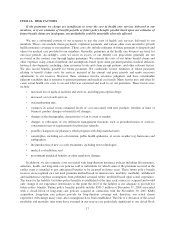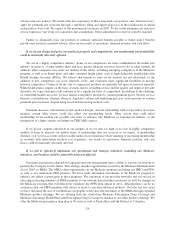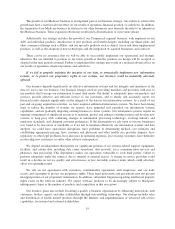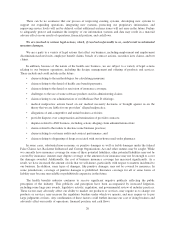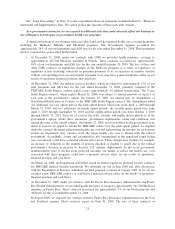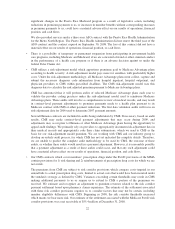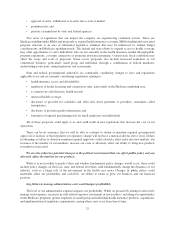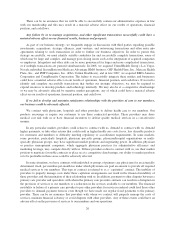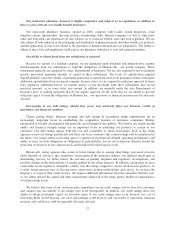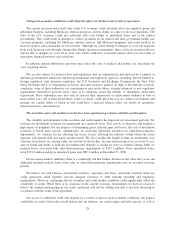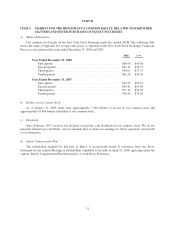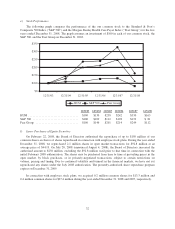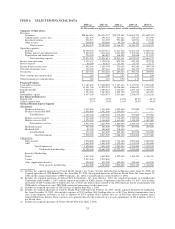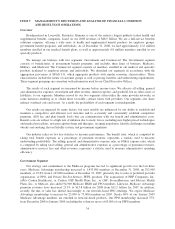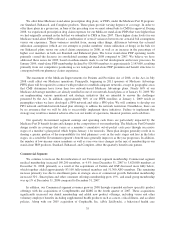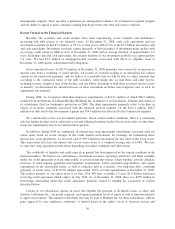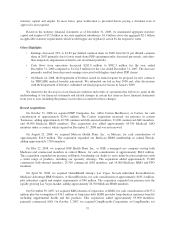Humana 2008 Annual Report Download - page 37
Download and view the complete annual report
Please find page 37 of the 2008 Humana annual report below. You can navigate through the pages in the report by either clicking on the pages listed below, or by using the keyword search tool below to find specific information within the annual report.Our mail-order pharmacy business is highly competitive and subjects us to regulations in addition to
those we face with our core health benefits businesses.
Our mail-order pharmacy business, opened in 2006, competes with locally owned drugstores, retail
drugstore chains, supermarkets, discount retailers, membership clubs, Internet companies as well as other mail-
order and long-term care pharmacies. It also subjects us to extensive federal, state and local regulation. We are
also subject to risks inherent in the packaging and distribution of pharmaceuticals and other health care products,
and the application of state laws related to the operation of internet and mail-services pharmacies. The failure to
adhere to these laws and regulations could expose our pharmacy subsidiary to civil and criminal penalties.
Our ability to obtain funds from our subsidiaries is restricted.
Because we operate as a holding company, we are dependent upon dividends and administrative expense
reimbursements from our subsidiaries to fund the obligations of Humana Inc., our parent company. These
subsidiaries generally are regulated by states’ Departments of Insurance. We are also required by law to maintain
specific prescribed minimum amounts of capital in these subsidiaries. The levels of capitalization required
depend primarily upon the volume of premium generated. A significant increase in premium volume will require
additional capitalization from our parent company. In most states, we are required to seek prior approval by these
state regulatory authorities before we transfer money or pay dividends from these subsidiaries that exceed
specified amounts, or, in some states, any amount. In addition, we normally notify the state Departments of
Insurance prior to making payments that do not require approval. In the event that we are unable to provide
sufficient capital to fund the obligations of Humana Inc., our operations or financial position may be adversely
affected.
Downgrades in our debt ratings, should they occur, may adversely affect our business, results of
operations, and financial condition.
Claims paying ability, financial strength, and debt ratings by recognized rating organizations are an
increasingly important factor in establishing the competitive position of insurance companies. Ratings
information is broadly disseminated and generally used throughout the industry. We believe our claims paying
ability and financial strength ratings are an important factor in marketing our products to certain of our
customers. Our debt ratings impact both the cost and availability of future borrowings. Each of the rating
agencies reviews its ratings periodically and there can be no assurance that current ratings will be maintained in
the future. Our ratings reflect each rating agency’s opinion of our financial strength, operating performance, and
ability to meet our debt obligations or obligations to policyholders, but are not evaluations directed toward the
protection of investors in our common stock and should not be relied upon as such.
Historically, rating agencies take action to lower ratings due to, among other things, perceived concerns
about liquidity or solvency, the competitive environment in the insurance industry, the inherent uncertainty in
determining reserves for future claims, the outcome of pending litigation and regulatory investigations, and
possible changes in the methodology or criteria applied by the rating agencies. In addition, rating agencies have
come under recent regulatory and public scrutiny over the ratings assigned to various fixed-income products. As
a result, rating agencies may (i) become more conservative in their methodology and criteria, (ii) increase the
frequency or scope of their credit reviews, (iii) request additional information from the companies that they rate,
or (iv) adjust upward the capital and other requirements employed in the rating agency models for maintenance
of certain ratings levels.
We believe that some of our customers place importance on our credit ratings, and we may lose customers
and compete less successfully if our ratings were to be downgraded. In addition, our credit ratings affect our
ability to obtain investment capital on favorable terms. If our credit ratings were to be lowered, our cost of
borrowing likely would increase, our sales and earnings could decrease and our results of operations, financial
position, and cash flows could be materially adversely affected.
27


